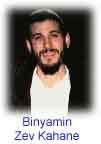

 Incitement and free speech
Incitement and free speech
By Jonathan Shiff
THE LIFE AND DEATH issues facing Israel often create a tendency to see issues in purely local context. A recent judgment regarding freedom of speech and incitement, however, while typical of the problems the Israeli courts must handle, raises many of the issues that a mature Western system has had to deal with, too.
Benjamin Kahane, son of the late Rabbi Meir Kahane, distributed a flyer in 1992, calling for the bombing of the Arab town of Uhm El Faham. This was in response to a terrorist bombing in Israel. Kahane was tried and convicted of incitement, which is defined in section 136 of the Israeli Criminal Code as, among other things, "awakening strife and hatred among different parts of the population." On March 2, his appeal to the Supreme Court was accepted and his conviction overturned by a 2:1 majority.
This is not the first time the courts have come down on the side of freedom of speech, and that right is well grounded in Israeli jurisprudence, even in the absence of a written constitution. In the early years of the state, the Supreme Court established that the government could use its powers to shut down newspapers only where it could show a "close certainty" that the incitement they contained would endanger the state.
In the Kahane case, the majority ruled that the crime of incitement is designed to protect democracy and the stability of the regime, but that it also places restrictions on freedom of speech. Therefore, the two values must be balanced. Justice Eliezer Goldberg argued that Israeli democracy has struck roots and grown stronger since the law was passed. Therefore, the state needs less protection, and the courts should place more emphasis on freedom of speech. In his opinion, people should be convicted of incitement only when there is a definite likelihood that the publication will actually incite. Goldberg wrote that Kahane's flyer was an infantile publication that posed no danger of actually inciting anybody.
Justice Eliyahu Matza dissented from the majority and pointed out that most racist arguments are infantile. In Matza's opinion, while Israeli democracy has certainly been strengthened over the years, there have been instances, such as the massacre in Hebron and the assassination of Yitzhak Rabin, which demonstrate the need to protect it from violent fringes, even at the expense of limitations on freedom of speech.
The issue of restricting freedom of speech in order to prevent racist incitement is not unique to Israel. In Canada, the courts have had to consider the matter carefully (i.e., the cases of Ernst Zundel and Jim Keegstra). There is a consensus among many that racism is an especially insidious form of incitement which justifies taking more severe measures.
Part of the problem is that limiting freedom of speech in order to protect democracy can backfire if courts interpret the ban liberally. One of the arguments used commonly in Israel since the Rabin assassination has been that one's opponent is using inflammatory and inciting language. Clearly not all strong language is illegal.
Furthermore, allowing the judges too much latitude creates a situation where a small group of
people are deciding what the rest of society is allowed to say and publish. Thus, a measure originally taken to protect democracy can boomerang. While the extremes are easy - complete freedom of speech or absolute police discretion - any attempt to balance different values will be messy and unsatisfying. Judges have no choice but to create tests to guide the police and prosecutors in an attempt to find the balance that will service society best.
Although the Kahane case ended in an acquittal and was clothed in the language of permitting speech, it actually could be construed as more limiting than previous precedents. If future courts choose to interpret Goldberg's "definite likelihood" test as less strict than a "close certainty," it could actually lead to more arrests and charges. It may sound as though the judges are playing with semantics, but they are trying to give expression to a reality that is not clear cut.
At the same time, an advantage of such attempts to balance competing values is that they are fluid and change with the needs of society. Therefore, the only thing one can say with certainty is that the Kahane case will not be the final word of the